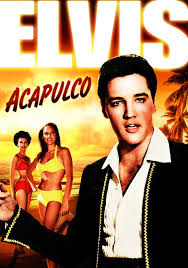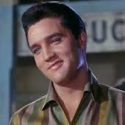Having Fun in Acapulco with Elvis is a Matter of Perspective

Fun in Acapulco (1963) tells the story of Mike Windgren (Elvis Presley), who is fired from his job at a show boat and has to take a job as a lifeguard at a nearby hotel in Acapulco. Mike, fearful of diving into the pool, faces his rival, another lifeguard, Moreno who becomes jealous of him for going out with his girl, Marguerita, and the two become enemies.
On one side, this movie depicts the different vicissitudes and troubles that Mike, a young American must face when working as lifeguard in the Mexico’s touristic town of Acapulco. He needs to work for less and attend many interviews with different hotel managers to find the best offer that he and his small partner Raoul, can find. On the other, Fun in Acapulco also shows the troubles that two ex-royals, Marguerita and her father Maximillian, must face when losing their high-class status and are forces to migrate to Mexico and work in the resort. However, the movie takes away from presenting the problems that the Mexican workers or citizens of Acapulco face with the surrounding and powerful economic forces that the hotel and truism industry display in Acapulco. For instance, the figure of Elsa Cardenas as a female bullfighter sends a romanticized image of a heroic figure who likes and chases handsome men. Elsa doesn’t have to work since she seems to have it all and also belongs to a higher social class than the rest of Mexicans. She even has a manager who tries to please her in all he can. But what about Raoul Almeido, the Mexican kid who manages Mike? How does he know so much about the managing business and what about his relationship with all his other ‘cousins’ in Acapulco?
As I see it, Fun in Acapulco focuses on Mike’s issues and takes away from the struggles of the Mexican characters. Or at least, it diminishes them by making them appear as fun and easy-go-lucky type of characters who are contempt with the situation they face. For example, while the audience gets to know that Mike, Marguerita and her dad, all live in the hotel complex, what about the Mexican kid, Raoul? And does Raoul’s extended family of cousins replace the need for a real family within the movie? What’s more, Fun in Acapulco seems to imply that Raoul’s ingenuity and resourcefulness would allow him to be okay even after Mike leaves the hotel for America. Raoul says, “I’ll find another nobody and turn him into a somebody.” In a sense, Raoul’s words allow the viewer to come to the conclusion that the kid, as well as all the other Mexican locals, are not and will not be affected by the tourism industry and the local authorities which regulate that business. What’s important within the movie is not the troubles that Acapulco’s third world location may bring such as poverty, housing issues for tourist workers, hygienic conditions, prostitution, etc., but the American visitor and worker, Mike. What matter are his struggles, his peruse of happiness, the way in which he seduces and captivates the local culture by becoming more Mexican than the Mexican singers. Elvis is a performer and as such, his character Mike, steels the show and adopts the Mexican music, customs, and culture as his own. Hence, the local Mexicans such as Raoul serve as mere background and fillers in the story of an American having fun in Acapulco.
Additionally, when the people of Acapulco are depicted in the movie, they are set to be taking “too many siestas (afternoon naps)”. Mike, then, contraposes this lazy idea of the siesta with his hard work, ambition and the willingness to overcome his diving fear. Mike is the center of attention in the movie and embodies performance, singing, athleticism throughout the whole movie. Mexico, and as a consequence, Acapulco serves to promote the idea of “tropical paradise”, where tourists can have a good time without worrying about anything, all while enjoying the tropical beauty that the landscape offers them. Elvis and his Mexican errant-boy, Raoul, make sort of a dynamic-duo, which allows Elvis to shine. Just like other characters have their side-kicks such as The Lone Ranger, Clayton Moore and his loyal Indian ‘friend’, Jay Silverheels as Tonto. If you ask me, this comparison while different in setting, is similar in racial differentiation and apparels characterization of the ‘other’.
Additionally, Mike the American immigrant but a temporary visitor to Acapulco changes jobs and professions seamlessly. But, Raoul, for instance, stays fixed to his surviving type-of-trade. This shows an advantage for the American character while placing the Mexican one to a defined set of rules with regards to his work, family, and future situation. In the end, only the American Mike, and the tourists he entertains, can have Fun in Acapulco. Hence, ignoring all the issues that the locals of the city of Acapulco may face by their presence.

